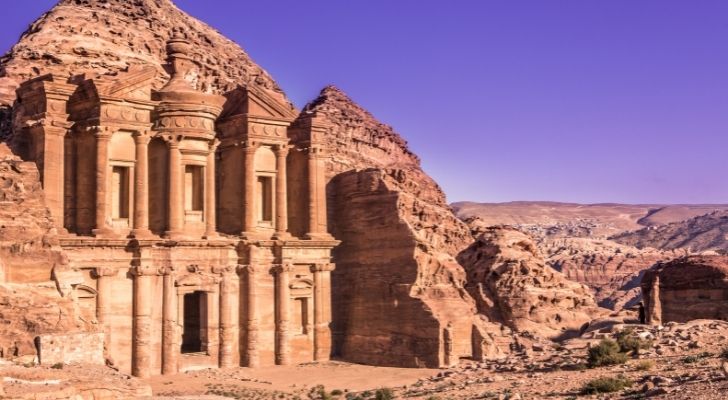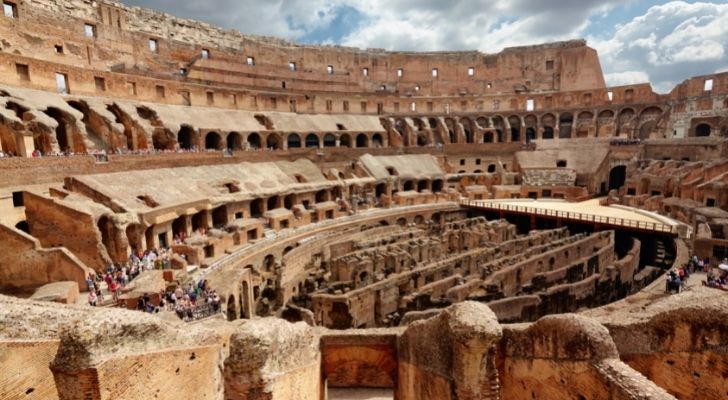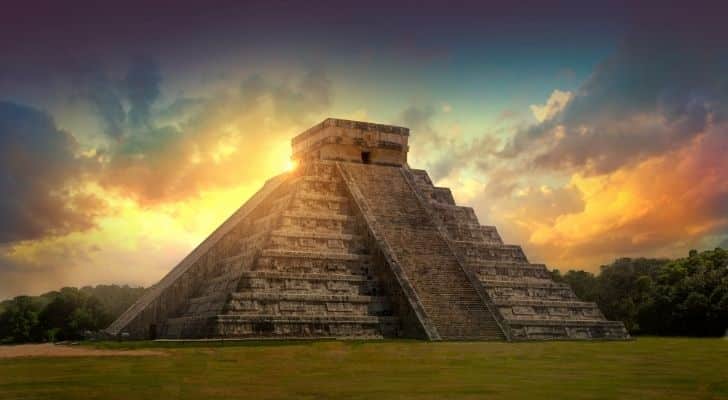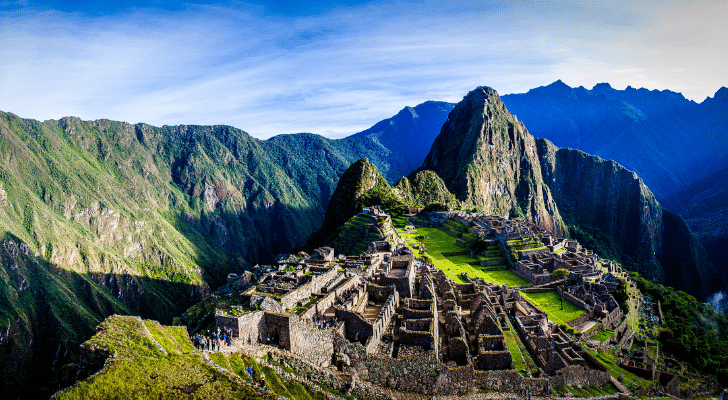Contrary to popular belief, the Seven Wonders of the World have actually changed over time. The original group was called the Seven Wonders of the Ancient World.
This is because six of the seven original wonders have sadly been destroyed over time, mainly from natural causes. The only one still standing is the Great Pyramid of Giza, which remains an honorary wonder.
The new list of the current Seven Wonders was finalized by a voting process that ended back in 2007.
So without further ado, let’s take a look at the Seven Wonders of the World!
The Great Wall of China

This one is a no-brainer – The Great Wall of China is the longest man-made structure ever built, and that doesn’t seem to be changing anytime soon, if ever!
At about 13,200 miles (21,200 km) long, this impressive wall took over 200 years to build.
It was mainly erected to protect China from attacks from northern tribes, such as the Mongolians. Most of the original wall doesn’t exist because it is constantly being restored and rebuilt due to its age.
Between natural erosion and tourism, it is in a state of rapid decline. Because of its huge size, it’s nearly impossible to maintain the entire wall.
Even though efforts are being made to preserve it, there’s no saying how long this impressive structure will stay standing. One thing is for sure; it will remain an important part of history forever.
Petra

Believe it or not, that impressive ancient city that you saw in Indiana Jones and the Last Crusade is a real place! Petra, located in Jordan, is a massive city built into sandstone that was once home to around 10,000 people.
Ancient citizens of Petra were incredibly skilled in harvesting rainwater, agriculture, and stone carving. The latter is represented by the 800 buildings, tombs, baths, funerary halls, temples, arched gateways, and streets within Petra that were mainly carved from stone.
One thing that has severely damaged the architecture of Petra is the rain.
Even though it hardly ever rains in the desert, when it does rain, it comes down quite violently. Still, Petra has been able to withstand these storms for centuries.
No one knows when this city was built, but it is estimated that it was possibly as early as the fifth century.
The Colosseum Amphitheater

Located in the heart of ancient Rome, the Colosseum is one of Italy’s most visited tourist attractions. Dating back to around 80 A.D., this structure remains the largest amphitheater in the world.
Admittedly, the history of the Colosseum is a brutal one. Impressive as it is, it was built by tens of thousands of slaves with stone and concrete.
Once completed, it could seat about 50,000 spectators who watched the events inside – usually gladiatorial combat, animal hunts, and even naval battles.
Many of the events at this amphitheater were free, with the costs covered by the emperor in order to gain support and popularity from the citizens.
What many people don’t know is that there were several underground rooms and passages below where both animals and gladiators were held before events.
Sadly, over time, around two-thirds of the Colosseum has been destroyed due to vandalism, earthquakes, and fires. Even so, the remaining structures are still jaw-dropping and worth a visit!
Chichen Itza

This primitive Mayan city is located on Mexico’s Yucatan Peninsula. While it is a popular tourist attraction, it is still an active archeological site with new discoveries being made from time to time.
It is estimated that Chichen Itza was built between the 9th and 12th centuries, with the area previously used as an observatory to survey astronomical events.
When it was an active city, it had the most diverse Mayan population, with around 50,000 inhabitants covering five square kilometers.
Many residents were skilled sculptors, weavers, jewelers, and potters, so it’s no wonder new historical relics are still being unearthed here!
Most of the sites of Chichen Itza are known for their strange sounds. For example, clapping your hands in front of the pyramid’s staircase will result in an echo that sounds like a chirp of a Mayan serpent deity.
Additionally, clapping at one end of the Ball Court will create nine distinct echoes in the center of the court.
Machu Picchu

This old Inca citadel located in Peru is surrounded by mystery. Constructed in the mid-1400s, Machu Picchu went undiscovered by Europeans until 1911. Even the Spanish conquistadors who decimated the Inca Empire never came close to finding it.
The construction of Machu Picchu is a mind-blowing feat in itself. It was built with granite rocks, some weighing over 55 tons (49.9 tonnes).
The stones were either pushed up the mountain by pure manpower or chiseled directly from the side of the mountain.
When it was completed, Machu Picchu was estimated to have had a population of around 300 to 1,000 inhabitants. Unfortunately, the Incas didn’t keep documented records, which leaves the true purpose of Machu Picchu a lost secret.
It was only occupied for 100 years before being abandoned, which is also a mystery. However, it is believed that it was left behind due to an outbreak of smallpox.
If you ever visit this Inca wonder, you’ll find that it is made up of over 150 buildings. And to stop the structures from falling down the mountain, the Incans built over 600 terraces!
The Taj Mahal Mausoleum

As the world’s most famous mausoleum, the Taj Mahal is India’s most popular attraction. This marble monument was commissioned in 1632 by the emperor at the time as a tomb for his favorite wife, Mumtaz Mahal.
The construction took just over 20 years to complete and cost around US$827 million. It also took about 20,000 artisans, as well as a thousand elephants to help with the transport of heavy materials.
The Taj Mahal wasn’t just ornate, but cleverly built, too. For example, it was designed so that everything would fall away from the tomb in the event of a collapse.
Even though this elaborate crypt was built for the emperor’s beloved wife, her actual grave is the only thing that is not decorated. This is because of Muslim law, which states that graves cannot be adorned as it is seen as a vain act.
Today, structural integrity is a concern. Some extreme assessments thought that the Taj Mahal would collapse by 2016. Of course, we know that it surpassed that date, but the decay is ever impending.
To protect its aesthetic, cars and buses are not allowed to come within 1,640 feet (500 meters) of the Taj Mahal to prevent gasoline exhaust from tarnishing the exterior.
Christ The Redeemer

The most recently built Wonder is the statue of Christ in Brazil which only took five years to build, with completion in 1931.
Inspiration for the statue was drawn from fear among Catholics who were worried that the nation was increasing in “godlessness.”
A local engineer designed the statue, with a few revisions along the way. Originally, it was a sketch of Christ carrying a cross in one hand and a globe in the other.
Of course, the design changed, and the finalized drawing is the statue you see today with open arms – a symbol of peace.
After finalizing the design, the engineer went to France, where he found a sculptor to create the piece. Starting in France, the statue ended up being 98 feet (29.9 meters) tall and made up of clay pieces which were then shipped to Brazil to be remade with reinforced concrete.
Concrete was one of the few things strong enough to support a sculpture of such size, but it had to be adorned with something in order to look nicer.
So, it was covered with around six million stone tiles! The workers who made the tiles would often write on the back – so this statue is covered with secret messages.
Christ the Redeemer has required many restorations over the years due to wind, rain, and lightning, with a major restoration completed in 2010.
In Conclusion
While the original Seven Wonders of the Ancient World may have been lost to time, the current Seven Wonders of the World are a testament to the incredible achievements of human civilization.
From the majestic Great Wall of China to Peru’s mysterious Machu Picchu, these wonders continue to captivate and inspire people from all over the globe.
So, if you’re ever in the mood for some awe-inspiring sightseeing, be sure to add these modern wonders to your travel bucket list!


















